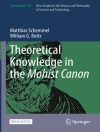Matthias Schemmel is Professor of Historical Epistemology at the University of Hamburg. He studied physics and astronomy (diploma in 1997) at the University of Hamburg and at Nanjing University, and history (doctoral degree in 2006) at the Humboldt University of Berlin. From 1997 to 2022 he worked at the Max Planck Institute for the History of Science. He studies the historical development of structures of knowledge connected to the exact sciences in their cognitive, material, and social dimensions, both from a long-term and a global perspective. The aim is to achieve an understanding of the place of scientific knowledge within human societies, as regards its epistemic status as well as its impact on society. In working toward this goal, he has pursued empirical, i.e. source-based, research in different areas marked by important knowledge transformations. These areas are: the emergence of theoretical science in ancient societies; transformations within the medieval and early modern European knowledge systems; the transfer of knowledge between cultures, particularly China and the West; and the reorganization of the knowledge of physics, astronomy and their neighboring disciplines in the twentieth century. He taught courses at the Technical University of Berlin, the Humboldt University of Berlin, and the University of Bern, Switzerland. From 2008 to 2012 he was the director of an interdisciplinary research group on the long-term development of spatial concepts. Current research and teaching activities further pertain to the political dimension of science and the role of science in the Anthropocene.
William G. Boltz is Professor of Classical Chinese, emeritus, at the University of Washington, Seattle. His teaching and research interests center on the philological analysis of ancient Chinese texts, transmitted works and discovered manuscripts alike. In this regard he has done considerable work on the early history of the Classical Chinese language and on the origin, developmental history and structure of the Chinese writing system, including comparative studies with writing systems of other ancient civilizations. He has been Deutscher Akademischer Austauschdienst Visiting Professor at the Asia-Afrika Institut of the University of Hamburg and twice in the Institut für Sinologie at the Westfälische Wilhelms-Universität Münster. He was Directeur d’ Études Associé at the École des Hautes Études en Sciences Sociales, Centre National de la Recherche Scientifique (Paris) and has also been numerous times a Senior Fellow at the Center for the Study of Manuscript Cultures (University of Hamburg) and at the Max Planck Institute for the History of Science (Berlin).
1 Ebooks oleh William G. Boltz
William G. Boltz & Matthias Schemmel: Theoretical Knowledge in the Mohist Canon
This open access book presents a new translation, interpretation and analysis of selected passages from the so-called Mohist Canon, a Chinese text from ca. 300 BCE, and discusses the role of the text …
EPUB
Inggris
DRM
€3.84

